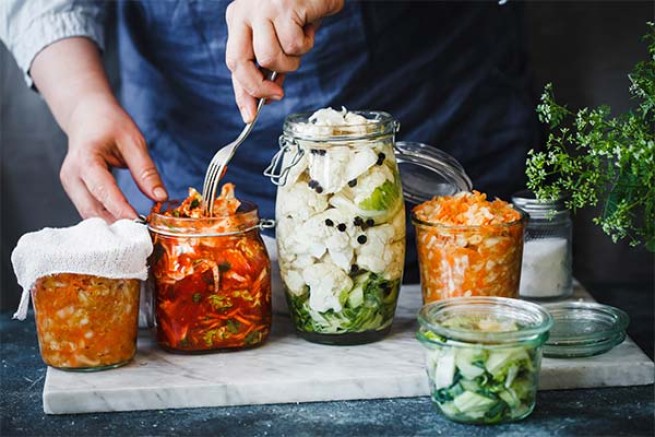To help the body cope with the cold weather awaiting us and support the immune system in winter, we begin to stock up on fermented vegetables.
Don’t be put off by the scary-sounding term. You all remember grandma’s cucumbers and tomatoes rolled into jars, right? Scientifically, these are the same “fermented vegetables”. However, in Greece, where fresh vegetables and herbs are available all year round, they are rolled into jars, i.e. there is no point in canning vegetables.
But “five minutes”, i.e. fermented salads (you can find a lot of recipes for which on the Internet) can be made in a hurry and already eaten within a day.
Fermentation is a natural fermentation during which microorganisms break down organic compounds due to lack of oxygen. Such products are enriched with beneficial minerals, vitamins B, C and K, omega-3 fatty acids, sodium, iron, antioxidants and probiotics.
Important! Fermentation at home is carried out without the participation of preservatives and “accelerators” of the process. The point is to fermentation occurred on its own, due to microorganisms or natural enzymes.
Fermentation can be caused by the breakdown of protein, as in meat or fish, by the work of lactic acid microorganisms, as in sauerkraut, with the help of a microbial culture, as in kefir or ayran, with the addition of rennet, as in cheese. Due to fermentation, products are preserved longer without losing their beneficial properties.
In fact, you can ferment anything – from vegetables and fruits to grains. For example, in Asia, beans and wheat sprouts have been fermented since ancient times, some French and Italian cheeses also undergo fermentation; in Spain, a traditional dish is fermented pork – jamon (dried meat).
Attention! Problems can arise with any food product. Fermented ones are no exception. Fermented foods may contain harmful microbes. With very few exceptions, lactic acid bacteria, yeasts and molds do not cause any disease or produce toxic substances. And even more than that: the acidic environment they create prevents pathogens that can cause food poisoning from multiplying. Scientists even suggest that fermentation was once invented precisely in order to preserve food from spoilage and protect against foodborne infections.
But if you store or cook poorly acidic fermented foods, such as some cheeses, sausages, fish and kombucha, they can become contaminated with harmful microbes such as listeria, salmonella and clostridia. Therefore, when preparing such products at home, it is important to strictly follow the recipe and follow the rules for the safe preparation of fermented food:
- Use only fresh ingredients and be sure to wash them before cooking. If there were already a lot of harmful microbes in the food, it will be difficult for lactic acid bacteria to suppress them.
- Use only clean utensils, knives and cutting boards. If you plan on canning fermented foods, be sure to sterilize your jars.
- Prepare the brine correctly. Lactic acid bacteria multiply well in a 1-15 percent saline solution.
- Meet deadlines. Typically, most fruits and vegetables require three to six weeks to ferment.







More Stories
Macedonian halva celebrates 100th anniversary
Greek "METAXA" among the most fashionable brandies according to Drinks International Report 2024
10 special and very tasty Greek cheeses